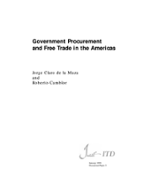Government Procurement and Free Trade in the Americas
Date
Jan 1999
EDITOR
INTAL
Governments in many countries -at all levels of development- struggle with increasing budget deficits and soaring national debts. Over the last century, government spending, as a percentage of gross domestic product has tended to increase and with it has increased the range of services offered by governments and the volume of public procurement resulting from it. The growth in public procurement has been accompanied by a growth in public procurement legislation. As the public sector grew, a need made itself to seek assistance form the private sector to provide public services on a contractual and sub-contractual basis. In various countries, especially those characterized by a civil law system, government contracts took on a peculiar nature, distinct from private contracts constituting a distinct legal category, separated form private contracts rules concerning contract formation, termination, settlement of disputes and other situations. As public procurement grew in volume and value, so did its importance to employment and the national economy. In most countries, the early procurement laws were protective of domestic industry. At the same time, competition for public business grew among nationals in step with the growth of public expenditure devoted to procurement of goods and services. These laws recognized the right of nationals to be treated equally, to have equal access to public contracts. As a result, the standard method of procurement would consist in an advertised opportunity for all interested firms to bid for public contracts on auction basis.



